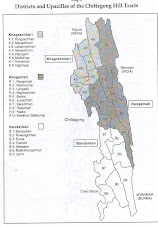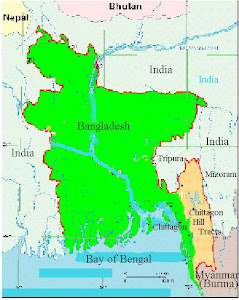
chtnews.com
July 06, 2009
IN Sajek, one of the flashpoints of Rangamati district, the last two months saw an increase in arrests and torture of innocent Jumma villagers, who continue to live in fear of settler attacks similar to the one carried out on 20 April last year. Some of these torture victims came to Dhaka to tell their stories to the journalists. chtnews.com had the opportunity to do interviews with them which we are repeating in a series. Please read the fourth and final part of the series below. The first part was sent on 3 July, the second part on 4 July and the third part on 5 July. All the interviews were conducted on Wednesday, 1 July.
8. Interview of Mintu Chakma, 27, Gangaram Dore
The day was Monday, 18 May. It was about 6am. I was sowing popcorn and long been seeds near my house.
There is a UNICEF-run village school near my house. I was taking a break from work and puffing a cigarette inside the school. My six-month old baby boy was beside me.
Suddenly, an army personnel and a police came up to me and said: ‘leave your boy to someone else and come with us.’
I said there was none in the house, but they insisted. Later, I put the boy to a young school girl and went with them.
They took me towards an army post in Gangaram. They asked whether I prevented any Bengali women from fetching water. I said it was only a joke.
They laid me on the ground, blindfolded and beat with a stick. Then they asked who killed Alkajya. I said ‘I do not know. I often stay at home and socialize with the Bengalis. I just heard that two persons had called Alkajya away.’
They said: ‘where did you keep your arms. If you show it to us, we will let you go.’
Later, they took me out of the post to the road. I was almost unable to walk. They took me to a Bengali’s shop and tied me to a pole. It was raining. A few minutes later, they led me to the main road.
My mother and many others came there. My mother was kowtowing to them, begging for my release. But they paid no heed and took me towards the post again.
On that day some army personnel were carrying firewood in a van. They got me on that van and took to Baghaihat zone. In the van I was beaten again.
When I was taken to the Gol Ghar [in Baghaihat zone camp], the army hit me on my knees. One soldier called me bastard and said: “we were looking for terrorists and have found one.” It was 3 o’clock by then. They gave me rice to eat. But they beat me with a cane while eating.
They gave me food at night too. But when I was refusing to take food, one soldier beat me with a stick and hit me with piece of roasted chicken.
At 11pm, they blindfolded me again. I was aware of the time because they were asking time from one another.
They kept me blindfolded all time except when they let me eat something.
At night, after eating they walked me around, blindfolded and with my legs tied.
They said: tell us the truth; who is your leader.
I said: I do not do such kind of things.
Then they gave me electric shocks. When they gave electric shocks, a stout army man got over my body and pressed me hard. I still do not feel my hands and legs.
After 2am they stopped beating. One soldier said to another: Sir, this guy will rather die then open his mouth.
Then someone – who might be an officer – came and asked them not to beat me any more.
Four army personnel were on sentry duty. They changed their duties. New ones took charge. One said: ‘Shall I beat’. Another one suggested he should not.
Yet, another one beat me. ‘My friend is being bitten by mosquitoes. Let me kill the mosquitoes for him.’ he said sarcastically and beat me.
In the morning, they said: ‘How is it! No one has come from your home. They [the army authority] might have released you if either your wife or your mother had come’
Around 11am, members of [Baghaihat] Bazaar Committee, Anwar, Kalakuchu, Gobinda Headman and Joti Lal came to the zone.
The Warrant Officer unfolded my eyes and said: “speak the truth or else you are going to die. Do you want to die or live?”
I said: I want to live, Sir.
They repeated the same question again and again. And when I said I knew nothing, they began beating me.
Finally, they led me to Gol Ghar and released me. I was unable to walk.
After release, I went to bazaar, borrowed some money and bought medicines. I went back home, tired.
It has become difficult for us Jummas to live in Sajek. The settlers often come and intimidate us and threaten us. They say “there will be military rule here. You must leave the area.”
They also steal things – such as clothes, utensils etc from our houses and fruits from our gardens. They even take away our chickens, and we cannot say anything. The army always patrols the area.
Krishna Chandra Chakma of Gangaram Dore cannot keep his two daughters at home. Arif, an army officer, teases them. His daughters’ names are Chokka and Kalabi. He sent Chokka to Rangamati and Kalabi to Korengatoli.
Arif once molested a young girl. Her name is Joari, a class three student. The incident occurred when she was on her way to Baghaihat Primary School. Arif grabbed her hand and made sexual advances. Joari protested and called him “Beyadob” (uncouth). But Arif, instead of being ashamed, became furious and threatened to do harm to her if she did not apologize. She found no other alternatives at that moment than to obey him.
Now the women folks cannot stay at home or go out all alone. There is fear of sexual attack. I had to send my sister, Sabina – a class five student – to Agalachara because of a fear of being sexually attacked by Arif.
There is nowhere we can complain. Arif threatened us saying: “if you mistreat any Bengali, I will finish you off. I will reduce everything to ashes.”
Warrant Officer Selim always employs abusive and filthy languages against the village elders. He never shows respect to them. No one dares to speak about it.
We are in deep anguish. We are at a loss what to do. Are we leading a human life in Sajek? Are we treated as human? I often ask to myself. As you know, we are all internally displaced persons (IDPs). We came here after being uprooted from our original homes by military oppression. When we settled in Sajek, we thought there would be no more army torture in there. But we were mistaken.
Even we had to pay a sum to be on the list of IDPs. We paid the money to JSS. I don’t know when our miseries will come to an end.





